Civil Liberties, Civil Rights, Human Rights, Prison Industry, Racist Police Violence, U.S. Militarism
Podcast: Play in new window | Download


You Might Go to Prison, Even Though You’re Innocent
There is a common belief that if you’re arrested, you are probably guilty because “where there’s smoke, there’s fire.” People assume that only the guilty confess to crimes because why would an innocent person confess to a crime they didn’t commit? And when a person pleads guilty or is convicted by a jury, that’s the end of the matter, in the minds of most people.
In fact, many innocent people are arrested, especially people of color, due to racial profiling and other forms of discrimination by law enforcement. Implicit bias often infects the case as it moves through the criminal legal system – from the initial police stop, to interrogation, arrest, charging, trial and sentencing. This is particularly tragic when a person is charged with a capital crime for which the death penalty is imposed and that sentence is carried out.
However, it is estimated that 10,000 to 20,000 people are currently serving time in prison after being convicted of crimes they did not commit, largely due to prosecutorial misconduct and police misconduct. Unfortunately, even when exonerated, the psychological and physical damage done is so extensive that many people are never able to fully recover from the trauma. In addition, when the wrongful conviction is solely the result of prosecutorial misconduct, those convicted have no legal recourse to be compensated for the wrong done to them because of prosecutorial immunity.
Guest – Justin Brooks criminal defense attorney and law professor has spent decades working to free innocent people from prison. The Founding Director of the California Innocence Project, Brooks is the author of the provocative new book, “You Might Go to Prison, Even Though You’re Innocent.” In it, he discusses false identifications, junk science, lying snitches, and incompetent defense lawyers – which too often lead to the imprisonment of innocent people.
—–


Junior ROTC In High Schools: Pressure To Join
On her first day of high school, Andreya Thomas and several other freshmen at Detroit’s Pershing High School learned they were enrolled in a class called J.R.O.T.C., or Junior Reserve Officers’ Training Corps. School administrators told them the program was mandatory.
Funded by the U.S. military, the program required students to wear military uniforms in class, recite patriotic declarations, and obey orders from an instructor who often yelled at them. When several tried to drop the class, school officials refused permission, even though the Pentagon says that requiring students to take the programs runs counter to its guidelines. The New York Times recently learned that thousands of public-school students were enrolled in J.R.O.T.C. either as a requirement or through automatic enrollment. Most of the schools with high enrollment numbers were attended largely by nonwhite students and those from low-income households.
Critics of Junior ROTC say that the program’s militaristic discipline prioritizes obedience over independence and critical thinking. And as we reported earlier on Law and Disorder, and now noted by the Times, the program’s textbooks often rewrite or downplay the failings of the U.S. government. With its concentration in schools with low-income and nonwhite students, some claim J.R.O.T.C. encourages students to enlist in the military rather than explore other routes to college or jobs in the civilian economy.
Guest – Rick Jahnkow works for two San Diego-based anti-militarist organizations, the Project on Youth and Non-Military Opportunities, or YANO, and the Committee Opposed to Militarism and the Draft. We spoke earlier with Rick about YANO’s J.R.O.T.C. textbook review project.
Hosted by Attorneys Heidi Boghosian, Marjorie Cohn and Julie Hurwitz

—————————————–
Civil Liberties, Civil Rights, Cuba, Gaza, Guantanamo, Human Rights, Prison Industry, Racist Police Violence, Supreme Court, Targeting Muslims, Torture, Truth to Power, U.S. Militarism, Violations of U.S. and International Law, War Resister, Whistleblowers
Podcast: Play in new window | Download


Cars and Jails: Freedom, Dreams, Debt and Carcerality
What is the connection between cars and jails? Every day more than 50,000 Americans are pulled over by police officers while driving. Most of them will come away from this encounter owing money to the municipality or county in which they were stopped. Some will be arrested. They will join the nearly 9,000,000 Americans to cycle through our countries’ jails each year.
Police can choose from hundreds of traffic code violations to make a pretext stop and conduct a vehicle search. This may result in a fine or or an arrest.
American consumer lore has long held the automobile to be “freedom machine” consecrating the mobility of a free people. Yet paradoxically, the car also functions at the crossroads of two great systems of unfreedom and immobility – the credit economy and the American carceral system.
Guest – Andrew Ross who along with his co-author Julie Livingston has investigated this paradox and written the book “Cars and Jails: Freedom, Dreams, Debt and Carcerality”. It was just published by OR Books. The book shows how the long arms of debt and the carceral state operate in tandem in the daily life of car use and ownership. Andrew Ross is a professor of social and cultural analysis at New York University, and a social activist and analyst. He has authored and edited numerous books and has written for the New York Times, the Guardian, The Nation, and Al Jazeera.
—-

Remembering Michael Ratner
Hosts Heidi Boghosian and Michael Smith remember Michael Ratner as cohost, activist, radical attorney, author and close friend. In this show, hosts reflect on Michael’s work and listen back to several monologue updates. They include his work as co-counsel for Wikileaks founder Julian Assange, the Dahiya Doctrine, SNAP- Survivors Network of those Abused by Priests, NSA survelliance in the Bahamas and Guantanamo Bay prisoner exchange.
Michael Ratner (1943-2016) was president emeritus of the Center for Constitutional Rights and author of Guantanamo: What the World Should Know. Michael worked for decades, as a crusader for human rights both at home and abroad litigating many cases against international human rights violators resulting in millions of dollars in judgments for abuse victims and expanding the possibilities of international law. He acted as a principal counsel in the successful suit to close the camp for HIV-positive Haitian refugees on Guantanamo Base, Cuba. Michael Ratner has litigated a dozen cases challenging a President’s authority to go to war, without congressional approval. In the wake of the September 11 attacks, the Center has focused its efforts on the constitutionality of indefinite detention and the restrictions on civil liberties as defined by the unfolding terms of a permanent war. Among his many honors were: Trial Lawyer of the Year from the Trial lawyers for Public Justice, The Columbia Law School Public Interest Law Foundation Award, and the North Star Community Frederick Douglass Award.
Hosted by Attorneys Michael Smith and Heidi Boghosian

——————————
Civil Liberties, Civil Rights, Human Rights, Racist Police Violence
Podcast: Play in new window | Download

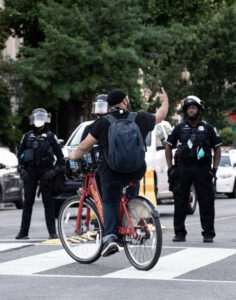
Alternatives to Policing
One of the pressing issues of the day is policing in America, notably how to confront the disproportionate unconstitutional use of force, shootings, arrests and prosecutions of Black African Americans and other people of color, with impunity. Can it be reformed? Or, must it be dismantled? On December 6 our own Julie Hurwitz facilitated a panel discussion at Wayne State Law School called “Alternatives to Policing.” It was sponsored by the NLG, Mich Coalition for Human Rights, Coalition for Police Transparency and Accountability and the Damon J. Keith Center for Civil Rights.
The panelists at this event:
Erin Keith: Managing Policy Counsel for Detroit Justice Center and an outspoken advocate on behalf of the Abolition/Defund movement, presents a thoughtful and clearheaded analysis of the fact-based evidence in support of this movement.
Michigan Congresswoman Rashida Tlaib: Discusses her efforts to fight from within US legislature to redirect resources away from policing and toward a broader understanding of “public safety” to include the need to confront head-on poverty, homelessness, health care, mental illness and the criminalization of people of color.
Andrea Ritchie: Attorney, writer, gay activist, and nationally recognized expert on policing and criminalization; Addresses the particular impact that policing in America has on Black/Women/Queer/trans people, and discusses her recently released book “No More Police.”
Michigan State Senator Stephanie Chang: discusses her efforts within the Michigan legislature to introduce state-wide laws that would create a modicum of accountability around: the use of force, decertification of “bad cops”, choke holds, no-knock warrants, foot pursuits and body worn cameras.
Alternatives To Policing Video
Hosted by Attorneys Heidi Boghosian and Julie Hurwitz

——————————-
Censorship, Civil Liberties, Civil Rights, Political Prisoner, Prison Industry, Racist Police Violence, Torture
Podcast: Play in new window | Download
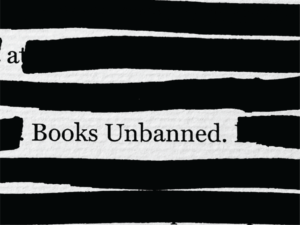

Books Unbanned
Authoritarian institutions and regimes ban books. They tell people what they can and cannot read. The Catholic Church once banned the book by mathematician Johannes Kepler which demonstrated that the earth travels around the sun and not vice versa.
Many of us know about the bonfires of banned books by the “degenerate Jews” Sigmund Freud and Karl Marx that the Fascist Hitler regime lit with a frenzy.
Can this happen in America? It has already started. Many state legislatures have moved to ban books. Some 250 titles have been put on a list of books that cannot be assigned to grade schoolers and highschoolers including such classics in the American canon as “To Kill a Mockingbird”’ and even “ Catcher in the Rye”
The censors don’t want to encourage free spirits. They don’t like criticism. For them the ideal citizen does not think for himself or herself, keeps her mouth shut, and goes along.
The Brooklyn public library is fighting for the rights of teenagers and young adults to read what they like, discover themselves, and form their own opinions. The library launched a campaign called “Books Unbanned” in response to the increasingly coordinated and effective effort to remove books from shelves which tackle a wide range of topics.
There were 1597 individual book challenges last year, the highest of 20 years since the American Library Association has been keeping track.
The Brooklyn public library is the sixth largest in the country. It started defending the right to read last April by giving free library cards to young people in every state in the union. So far 5100 cards have been given out. 52,000 e-books or audiobooks have been checked out. The books that are most frequently challenged are those on sexuality and those on racism.
Guest – Nick Higgins, Chief Librarian at Brooklyn Public Library, leading the development of transformative library services and spaces for the borough’s residents at 61 sites. Along with providing traditional programs and experiences for Brooklynites, Nick and his team have expanded the Library’s reach by creating unique programs for older adults, individuals and families impacted by the justice system, immigrants, and people experiencing homelessness. Nick holds a BA in Literature from Hunter College and a MLS from the Pratt Institute. Booksunbanned@bklynlibrary.org
—-


Law and Disorder hosts Heidi Boghosian and Michael Smith remember New York City Attorney and publisher Bill Schaap.
Bill Schaap died in his home on February 25th after a long illness. He was 75. After graduating from the University of Chicago Law school in 1964 Schaap worked for the Center for Constitutional Rights on its project in Japan representing antiwar GIs during the Vietnam war. For 20 years he and his companion the late Ellen Ray lived in Washington DC and published and wrote for the magazine “Covert Action Quarterly” which exposed the crimes of the CIA. In its early years they named CIA agents, until a naming names act was passed by Congress making the exposure of agents a crime. In the early 80s they moved to New York City and founded Sheridan Square Press. They published books about the CIA by former CIA agents. Most prominently they published New Orleans district attorney Jim Garrison’s book “On the Trail of the Assassins” showing CIA involvement in the Kennedy assassination. The book became a New York Times bestseller and was the basis for the Oliver Stone movie “JFK”. In the early 90s they founded the Institute For Media Analysis and began publishing the magazine “Lies of Our Times”, a magazine of media criticism. Bill Schaap was a recognized expert in government propaganda and wrote and spoke widely and frequently on the topic.
—-
Lawyers You’ll Like: Attorney Bill Schaap
Attorney William Schaap graduated from the University of Chicago Law School in 1964 and has been a practicing lawyer since. Bill specialized in military law and practiced in Asia and Europe. He later became the editor in chief of the Military Law Reporter in Washington for a number of years. In the 70’s and 80’s he was a staff counsel of the Center for Constitutional Rights in New York City. In the late 80s, he was an adjunct professor at John J. College of Criminal Justice of the City University of New York where he taught courses on propaganda and disinformation.
Attorney William Schaap:
- One of first cases at this big Wall Street firm, they had some outside counsel working on it, one of whom was David Lubel, and Dave Lubel who had I think been a recruiter for the Communist Party in his youth, was always good at spotting somebody who was always worth recruiting and he started to tell me there was this convention of this lawyers group.
- It was this 1967 Lawyers Guild Convention in New York. He dragged me to one event, I met Bill Kunstler, I met Arthur Kinoy, I met Victor Rabbinowitz. I’d been on Wall Street for a year or two, I said I didn’t know there were lawyers like this.
- I joined the same day and met Bernadine Dorhn and a few weeks she called me and said we need your help.
- She said you gotta defend a bunch of Columbia students. The next thing I knew the riot started at Columbia and she said you have to go down there and defend them.
- I signed up to be staff counsel on the National Lawyers Guild Military Law Project in Okinawa, Japan.
- When you work overseas in that kind of a climate with the military you learn a lot fast about American imperialism.
- Once you learn that, you learn about the CIA.
- That led us to originally working on Counter Spy magazine and then on Covert Action Magazine.
- The original purpose was to expose the CIA. We worked with Lou Wolf who is an expert in uncovering CIA agents in US embassies, not through any classified documents but because if you knew how to read the paperwork and State Department things, you could tell who are the “ringers.”
- We were so successful that Congress passed a law against us.
- Our goal was to make these people ineffective because the only way most CIA could work, particularly the ones that were assigned to an embassy was to have to pretend to be something else.
- They were all third assistant political secretaries and those were all phony things. Their job was to finagle their way into various community organizations in whatever foreign capital they were posted to recruit people to turn against their own countries and become traitors to their own countries, to become spies for the U.S.
- We thought if we identified these people, it might make their job a little bit harder, which it did.
- Of course, the problem with that is the government said we were trying to get them killed which we weren’t trying to do and nobody we did expose ever did get killed.
- He (Philip Agee) had been an adviser to Counter Spy. Counter Spy folded when Welch got killed, cause the pressure was too much and started Covert Action Quarterly.
- He was not the person discovering who the under cover people were, Lou Wolf was doing that.
- Phil wrote articles for us in every issue and we worked very closely with him.
- Once you start exposing these things, they really don’t have any defense.
- They tried to catch us in something phony. We would get tips that would turn out to be CIA trying to get us to print some story that wasn’t true so they could then discredit us.
- We had more interference from the government when we were doing military law work, before Covert Action Quarterly.
- They would plant bugs in our attic in Okinawa, things like that.
- The Intelligence Identity Protection Act has 2 parts. One makes it a crime for someone in the government who has classified information to reveal someone’s identity. The second part makes it a crime to reveal the identity of someone you did not learn from classified information or you position. (But if you were in the business of exposing these people . . .)
- Regarding his newsletter The Lies of Our Times – It was in the 90s, from 1990 to 1995 I think. To a certain extent, the abuses we were crying about got a little bit less over time because that’s sometimes the helpful result of that kind of exposure.
- We were just tired of people thinking that if it was in the New York Times it must be true.
- The fact is that those people lie all the time.
- I think we’ve gotten to a point where people recognize that the government lies to them and that there’s an awful lot that goes on that they don’t know.
Guest – Attorney William Schaap graduated from the University of Chicago Law School in 1964 and has been a practicing lawyer since. Bill specialized in military law and practiced in Asia and Europe. He later became the editor in chief of the Military Law Reporter in Washington for a number of years. In the 70’s and 80’s he was a staff counsel of the Center for Constitutional Rights in New York City. In the late 80s, he was an adjunct professor at John J. College of Criminal Justice of the City University of New York where he taught courses on propaganda and disinformation.
In addition to being a practicing lawyer, Bill was a journalist, publisher and a writer specializing in intelligence as it relates to media. He was the co-publisher of a magazine called the Covert Action Quarterly for more than 20 years. He also published a magazine on propaganda and disinformation titled Lies Of Our Times. Attorney Bill Schapp has written numerous articles and edited many books on the topic of media and intelligence.

—————————-
Civil Liberties, Civil Rights, Criminalizing Dissent, Political Prisoner, Prison Industry, Racist Police Violence
Podcast: Play in new window | Download

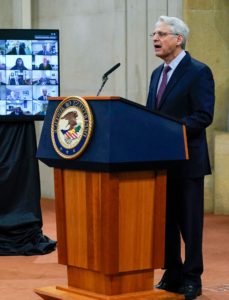
January 6 Committee Has Provided Sufficient Evidence for Garland to Indict Trump
During the course of eight public hearings, the House of Representatives Select Committee to Investigate the January 6 Attack presented overwhelming evidence of former President Donald `Trump’s guilt of at least 2 federal crimes and crimes in the state of Georgia. Although it has been more than 2 years since Trump initiated his wide-ranging conspiracy to overturn the results of the 2020 presidential election, Attorney General Merrick Garland still has not indicted the ex-president.
Through the testimony primarily of Trump loyalists, the Committee demonstrated that Trump was the fulcrum of a multipronged conspiracy to fraudulently declare himself the winner of the election. The Committee has provided Garland with more than enough evidence to indict Trump. But will Garland bring charges against Trump?
Guest – Marjorie Cohn, is a former criminal defense attorney, professor emerita at Thomas Jefferson School of Law and past president of the National Lawyers Guild. She has published several books and writes a regular column for Truthout. Her most recent piece is titled, “January 6 Committee Has Provided Sufficient Evidence for Garland to Indict Trump.”
—-
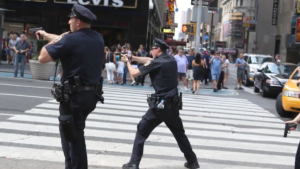
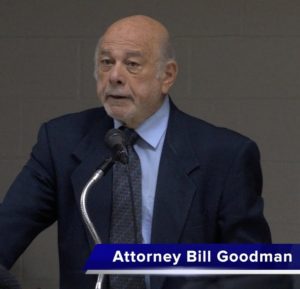
Lawyers You’ll Like: Attorney Bill Goodman
Bill Goodman, the son of Ernie Goodman, who was one of the founding members of the National Lawyers Guild, is a legend in his own right. A past national president of the NLG, one of the founding officers of the NLG National Police Accountability Project, the former Legal Director of the Center for Constitutional Rights, and a founding board member of the Sugar Law Center for Economic and Social Justice, Bill was also a partner in the first racially integrated law firm in the United States. He is currently a partner in the Detroit civil rights firm, Goodman Hurwitz & James, where he continues to work tirelessly for the rights of victims of government and corporate abuse. Bill is also an adjunct professor of law at Wayne State Law School, where he teaches Constitutional Litigation. Bill has successfully litigated numerous police and government misconduct cases as well as other high-profile cases on behalf of prisoners, toxic tort victims, the wrongfully convicted and victims of racism, always in the pursuit of constitutional, social and economic justice.
Host Attorney Julie Hurwitz: Bill is also my law partner in Goodman Hurwitz & James and a former long-term partner in life – we’ve known each other a long time! We’ll discuss two cases that have been brought to confront the unconstitutional and inhumane conduct of individual police officers, but more importantly, the historically unconstitutional and inhumane ways in which police departments institutionally tolerate, promote and reward such behavior by their officers.
Hosted By Attorneys Marjorie Cohn and Julie Hurwitz

——————————————
Civil Liberties, Civil Rights, Racist Police Violence, Right To Dissent
Podcast: Play in new window | Download

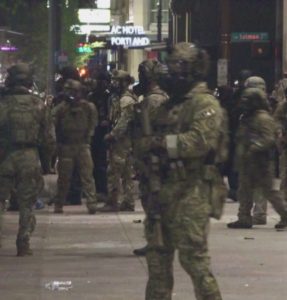
Remembering The Life Of Glen Ford
Glen Ford died last July 28 of lung cancer. I knew Glen the last seven years of his life. I first met him in 2014 after a speech that he gave at Harlem’s Riverside Church church on the occasion of the 7th anniversary of the Black Agenda Report of which he was the executive editor. The two other editors were Margaret Kimberley, who has taken over as the editor, and the late Bruce Dixon of Chicago who died two years ago. They were a formidable threesome. That night he spoke about what he called the Black misleadership class, a description he coined, and how it was an enemy of the movement. He said the Democratic party, which they populate, was not the lesser of two evils but the most effective of two evils. In particular, he zeroed in on New Jersey Senator Cory Booker. I kept in touch with Glen. He was a guest on Law And Disorder several times. I helped assemble a selection of his writings titled The Black Agenda which will very soon be published by OR books. Two months ago the publisher of OR books, Colin Robinson and I drove out to New Jersey to visit Glen.
He had just got out of the hospital where they took fluid out of his cancerous lung. He was somewhat frail but pretty chipper. We ate bagels and cream cheese at the dining room table and talked politics for two hours. As we left Colin remarked that it was a shame we hadn’t recorded our conversation. Glen was brilliant. Glen was the real thing. A Black nationalist and a socialist, as he described himself. He was a former Black Panther and usually wore a black beret when he spoke. He ended his speeches with his right arm held high in the air saying “power to the people.“
—-
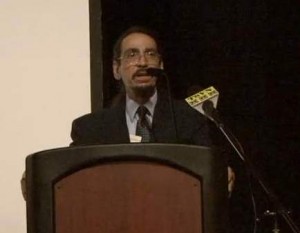

The Black Misleadership Class Versus the Movement and its Legacy
We go now to hear Glen Ford speaking at the Black Agenda Report 7th anniversary gathering at Harlem’s Riverside Church. The theme of the event was ““The Black Misleadership Class Versus the Movement and its Legacy.” Ford gives strong criticism of newly elected New Jersey Senator Cory Booker as the essence of Black misleadership, showing the many ties of the current Newark mayor to corporate America.
Guest – Glen Ford, editor of the Black Agenda Report. Ford founded the Black Agenda Report and has edited it since 2006. He was a founding member of the Washington chapter of the National Association of Black Journalists and he has delivered presentations at many colleges and universities.

——————————————–





















